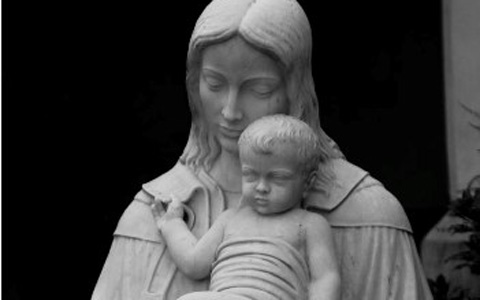Advent is just around the corner, and if you are like many people, you probably feel like it snuck up, perhaps catching you by surprise. In the busyness of this life, what can you do to prepare well without overwhelming? It’s not too late! Here are some ideas to get you started to have the best Advent ever:
Kick off Advent with Confession. Start with a good examination of conscience. You can find this on the United States Conference of Catholic Bishops (USCCB) website. It’s gold. Once you’ve pondered your faults and made the effort to receive this sacrament (yes, this week), the channel of graces can pour in, and you’re ready for the next Advent step.
Make a trip to the Catholic bookstore, either in person or online. Get yourself a good Bible that you won’t be afraid to mark up. Then read. Underline, circle, asterisk. Use tabs. Mark in some way what passages are most meaningful to you. Maybe you want to start with the New Testament and commit to reading one of the Gospels. Or pick one of Paul’s Letters, or hit the Old Testament by going to Proverbs, Sirach, or the Psalms. Set aside ten minutes a day to privately immerse yourself in God’s word. He will speak to you through this if you set aside time for Him.
While you’re at the bookstore, pick up some Advent candles and a wreath. Maybe you will find an Advent devotion book as well. If not, no worries. You can dedicate each of the four weeks of Advent to a different cardinal virtue.
According to the Catechism of the Catholic Church, Four virtues play a pivotal role and accordingly are called “cardinal”; all the others are grouped around them. They are: prudence, justice, fortitude, and temperance. . . (CCC 1805).
Pondering the virtues as a family group is a great way to prepare for Jesus’ birth and grow in holiness (and build bonds) within your own home. Here’s how to do this: After your family gathers for dinner each night, the father of the family lights the candle and reads one of the passages suggested below. Family discussion can follow.
Week One: Prudence
Prudence is the virtue that disposes practical reason to discern our true good in every circumstance and to choose the right means of achieving it; “the prudent man looks where he is going. (CCC 1806).
Where we are going in Advent is toward Christmas and preparing our hearts for Christ. The best gift we can give Christ is the cultivation of goodness and the purity of our souls. Some short readings related to prudence include the following: Proverbs 10:19, Amos 5:13, Proverbs 12: 16, Proverbs 15:5, Proverbs 22:3, Luke 14: 28-32, James 3:5-8.
After the father of the household does a reading, he can lead the family in discussion of the ways each person practiced (or was challenged by) prudence that day. What were the circumstances? How difficult was it? Did he fail and need to try again or was he successful in overcoming temptation? Dad might start by sharing an instance himself. For example, “I was driving to work today and a person in a car cut in front of me rudely. I was tempted to gesture angrily but I took a deep breath and said a quick prayer for the person instead.” Or, “I took a phone call from an angry customer who swore at me. I was tempted to return harsh words but instead I kept silent until I could say what I needed to in the right manner.” He may explain how silence really can be ‘golden’, and that a prudent man thinks before speaking.
Pondering the responses to events of the day serves as a mini examination of conscience with resolve to do better the next time. Having the father lead the family establishes his authority with the children and also makes it easier for other family members to share. The exercise itself is also an example of prudence, whereby actions of the day are carefully and thoughtfully considered.
Week Two: Justice
Justice is the moral virtue that consists in the constant and firm will to give their due to God and neighbor. Justice toward God is called the “virtue of religion.” Justice toward men disposes one to respect the rights of each and to establish in human relationships the harmony that promotes equity with regard to persons and to the common good. The just man, often mentioned in the Sacred Scriptures, is distinguished by habitual right thinking and the uprightness of his conduct toward his neighbor. (CCC 1807)
Bible quotes related to justice to be read and discussed each night include: Proverbs 21:15, Psalm 37:27-29, Isaiah 61:8-9, Luke 18:1-8, Isaiah 1: 17, Isiah 51:4-5, Deuteronomy 16:20. Things to discuss: What is the connection between justice and charity? What is meant by this: “Character is demonstrated by how a person acts when no one is looking”?
Week Three: Fortitude
Fortitude is the moral virtue that ensures firmness in difficulties and constancy in the pursuit of the good. It strengthens the resolve to resist temptations and to overcome obstacles in the moral life. The virtue of fortitude enables one to conquer fear, even fear of death, and to face trials and persecutions. (CCC 1808)
This week, the Advent readings each night are not from the Bible, but about the saints. Each night a different short saint story will be read. You can Google summaries of these stories, or refer to a saint book you may have at home. Choose saints in whom you are interested, perhaps letting each member of the family select. Saints that demonstrated particular fortitude include: St. Paul, St. Sebastian, St. Joseph, St. Francis of Assisi, St. George, St. Thomas A Becket, St. Thomas More, St. Joan of Arc, St. Clare, St. Monica… Discussion each night this week during the lighting of the Advent candle are how each of these saints demonstrated the virtue of fortitude and how the family can too in daily life.
Week Four: Temperance
Temperance is the moral virtue that moderates the attraction of pleasures and provides balance in the use of created goods. It ensures the will’s mastery over instincts and keeps desires within the limits of what is honorable. (CCC 1809)
What are the pleasures we must moderate daily? Eating and drinking obviously come to mind, but also what about excess recreation, time on social media, procrastinating daily duties? Bible quotes related to temperance to read each night this week and briefly talk about include: Proverbs 23:20, Proverbs 25:28, Proverbs 25:16, Titus 2:3, 1 Corinthians 10:31, 1 Corinthians 6:19-20, Romans 6:12.
These readings are short, but they are pack full of wisdom to ponder. You may even want to ask your children to memorize one of these quotes a day or week.
Integrate feast days that occur in Advent into your family life. Prominent ones include the Feast of St. Nicholas (Dec. 6), Feast of the Immaculate Conception (Dec. 8), Feast of Our Lady of Guadalupe (Dec. 12). Ideas for these feasts can be found here, and here, and here. Lastly, consult this guide from last year.
What we don’t do is as important as what we do this Advent. We should not select activities that stress us out. We should not over plan beyond our realistic schedules and abilities. We should aim for quality of preparation, not accomplishing every suggestion we’ve read. We should focus on becoming rather than doing. We train ourselves in virtue and model that to those around us.
Following this simple plan, families can realistically grow in holiness in preparation for Christmas Day. They will then be ready on December 25 to celebrate our Savior’s birth with the best gift that any of us can give- our sincere and best selves to God and others.

















